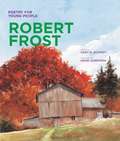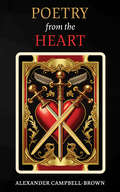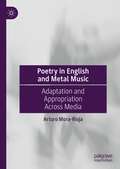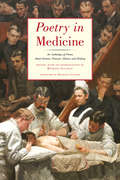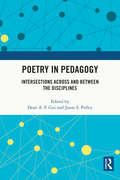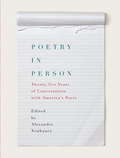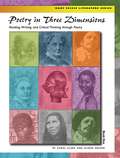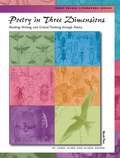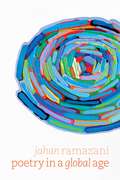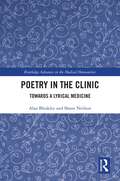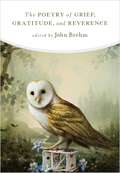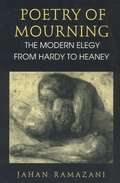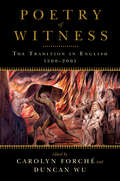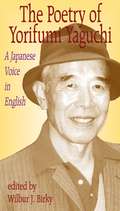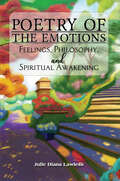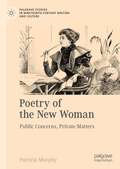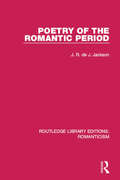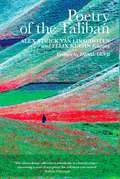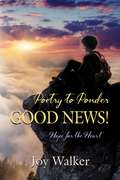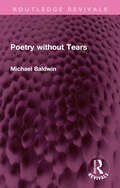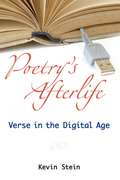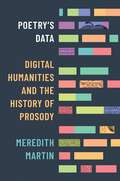- Table View
- List View
Poetry for Young People: Robert Frost
by Gary D. SchmidtA collection of poems about the four seasons by one of best-known American poets.
Poetry from the Heart
by Alexander Campbell-BrownExperiences. Emotions. Told through poems that speak more than their words. Based on personal experiences, experiences of others and those more universally experienced. A home within the words. Lives within the pages. Have you ever had an experience that you couldn’t just quite describe: to be so full of emotion that you couldn’t verbalise exactly how you’re feeling? Flip through these pages and discover the words that you were missing. Written from those same raw, human experiences and emotions. For any and all to enjoy. A range of poems from personal and everyday troubles to topics dealing with society and governance. Delve into the realms of romance and friendships, or perhaps under a tree with nature; join us on the true adventures of the life within. Whatever your preferences, there’ll be a poem in here, waiting for you to discover it. All you need to do is sit back and read.
Poetry in English and Metal Music: Adaptation and Appropriation Across Media
by Arturo Mora-RiojaMany metal songs incorporate poetry into their lyrics using a broad array of techniques, both textual and musical. This book develops a novel adaptation, appropriation, and quotation taxonomy that both expands our knowledge of how poetry is used in metal music and is useful for scholars across adaptation studies broadly. The text follows both a quantitative and a qualitative approach. It identifies 384 metal songs by 224 bands with intertextual ties to 146 poems written by fifty-one different poets, with a special focus on Edgar Allan Poe, John Milton's Paradise Lost and the work of WWI's War Poets. This analysis of transformational mechanisms allows poetry to find an afterlife in the form of metal songs and sheds light on both the adaptation and appropriation process and on the semantic shifts occasioned by the recontextualisation of the poems into the metal music culture. Some musicians reuse – and sometimes amplify – old verses related to politics and religion in our present times; others engage in criticism or simple contradiction. In some cases, the bands turn the abstract feelings evoked by the poems into concrete personal experiences. The most adventurous recraft the original verses by changing the point of view of either the poetic voice or the addressed actors, altering the vocaliser of the narrative or the gender of the protagonists. These mechanisms help metal musicians make the poems their own and adjust them to their artistic needs so that the resulting product is consistent with the expectations of the metal music culture.
Poetry in Medicine: An Anthology of Poems About Doctors, Patients, Illness and Healing
by Michael Collier Michael SalcmanInfused with hope, heartbreak, and humor, this book gathers our greatest poets from antiquity to the present, prescribing new perspectives on doctors and patients, remedies and procedures, illness and recovery. A literary elixir, Poetry in Medicine displays the genre's capacity to heal us. For millennia poets have described the ailments of the body and those who treat them. Infused with hope, heartbreak, and unexpected humor, this book gathers diverse poems about our medical experiences--poems about doctors and patients, remedies and procedures, illnesses and convalescence--each one prescribing a unique perspective and new revelations. A literary elixir, Poetry in Medicine showcases not only the breadth of poetry's relationship to medicine, but also the genre's unparalleled capacity to heal us. Contributors include Auden, Baudelaire, Berryman, Blake, Bishop, Boland, Campo, Cavafy, Clampitt, Chaucer, Clifton, Cummings, Dickinson, Donne, Conan Doyle, Eliot, Frost, Gunn, Hall, Hass, Hayden, Hirsch, Heaney, O. W. Holmes, Kooser, Larkin, Longfellow, Lowell, Merrill, Milne, Milton, Nash, Ovid, Pinsky, Plath, Rilke, Shakespeare, Seshardi, Sexton, Stevens, Szymborska, Whitman, Williams, Yeats, et al.
Poetry in Pedagogy: Intersections Across and Between the Disciplines
by Jason S. Polley Dean A. F. GuiThe essays compiled in Poetry in Pedagogy: Intersections Across and Between the Disciplines offer praxes of poetry that cultivate a community around students, language, and writing, while presenting opportunities to engage with new texts, new textual forms, and new forms of text-mediated learning. The volume considers, combines, and complements multiform poetry within and beyond existing Teaching & Learning paradigms as it traverses Asia, The Atlantic, and Virtual Space. By virtue of its mélange of intersecting trajectories, across and between oceans, genres, disciplines, and sympathies, Poetry in Pedagogy informs interdisciplinary educators and practitioners of creative writing & poetry involved in examining the multiform through international, cross-disciplinary contexts.
Poetry in Person
by Alexander Neubauer"In the fall of 1970, at the New School in Greenwich Village, a new teacher posted a flyer on the wall," begins Alexander Neubauer's introduction to this remarkable book. "It read 'Meet Poets and Poetry, with Pearl London and Guests.'" Few students responded. No one knew Pearl London, the daughter of M. Lincoln Schuster, cofounder of Simon & Schuster. But the seminar's first guests turned out to be John Ashbery, Adrienne Rich, and Robert Creely. Soon W. S. Merwin followed, then Mark Strand and Galway Kinnell.London invited poets to bring their drafts to class, to discuss their work in progress and the details of vision and revision that brought a poem to its final version. From Maxine Kumin in 1973 to Eamon Grennan in 1996, including Amy Clampitt, Marilyn Hacker, Paul Muldoon, Nobel laureate Derek Walcott, and U.S. poet laureates Robert Hass, Robert Pinsky, Louise Glück, and Charles Simic, the book follows an extraordinary range of poets as they create their poems and offers numerous illustrations of the original drafts, which bring their processes to light. With James Merrill, London discusses autobiography and subterfuge; with Galway Kinnell, his influential notion that the new nature poem must include the city and not exclude man; with June Jordan, "Poem in Honor of South African Women" and the question of political poetry and its uses. Published here for the first time, the conversations are intimate, funny, irreverent, and deeply revealing. Many of the drafts under discussion--Robert Hass's "Meditation at Lagunitas," Edward Hirsch's "Wild Gratitude," Robert Pinsky's "The Want Bone"--turned into seminal works in the poets' careers.There has never been a gathering like Poetry in Person, which brings us a wealth of understanding and unparalleled access to poets and their drafts, unraveling how a great poem is actually made.From the Hardcover edition.
Poetry in Three Dimensions: Reading Writing and Critical Thinking Through Poetry (Book One )
by Carol Clark Alison DraperThis book is a collection of works by Americans: African Americans, Asian Americans, European Americans, Hispanic Americans, and Native Americans.
Poetry in Three Dimensions: Reading Writing and Critical Thinking Through Poetry (Book Two)
by Carol Clark Alison DraperThis book is a collection of works by Americans: African Americans, Asian Americans, European Americans, Hispanic Americans, and Native Americans.
Poetry in a Global Age
by Jahan RamazaniIdeas, culture, and capital flow across national borders with unprecedented speed, but we tend not to think of poems as taking part in globalization. Jahan Ramazani shows that poetry has much to contribute to understanding literature in an extra-national frame. Indeed, the globality of poetry, he argues, stands to energize the transnational turn in the humanities.Poetry in a Global Age builds on Ramazani’s award-winning A Transnational Poetics, a book that had a catalytic effect on literary studies. Ramazani broadens his lens to discuss modern and contemporary poems not only in relation to world literature, war, and questions of orientalism but also in light of current debates over ecocriticism, translation studies, tourism, and cultural geography. He offers brilliant readings of postcolonial poets like Agha Shahid Ali, Lorna Goodison, and Daljit Nagra, as well as canonical modernists such as W. B. Yeats, Wallace Stevens, T. S. Eliot, and Marianne Moore. Ramazani shows that even when poetry seems locally rooted, its long memory of forms and words, its connections across centuries, continents, and languages, make it a powerful imaginative resource for a global age. This book makes a strong case for poetry in the future development of world literature and global studies.
Poetry in the Clinic: Towards a Lyrical Medicine (Routledge Advances in the Medical Humanities)
by Shane Neilson Alan BleakleyThis book explores previously unexamined overlaps between the poetic imagination and the medical mind. It shows how appreciation of poetry can help us to engage with medicine in more intense ways based on ‘de-familiarising’ old habits and bringing poetic forms of ‘close reading’ to the clinic. Bleakley and Neilson carry out an extensive critical examination of the well-established practices of narrative medicine to show that non-narrative, lyrical poetry does different kind of work, previously unexamined, such as place eclipsing time. They articulate a groundbreaking ‘lyrical medicine’ that promotes aesthetic, ethical and political practices as well as noting the often-concealed metaphor cache of biomedicine. Demonstrating that ambiguity is a key resource in both poetry and medicine, the authors anatomise poetic and medical practices as forms of extended and situated cognition, grounded in close readings of singular contexts. They illustrate structural correspondences between poetic diction and clinical thinking, such as use of sound and metaphor. This provocative examination of the meaningful overlap between poetic and clinical work is an essential read for researchers and practitioners interested in extending the reach of medical and health humanities, narrative medicine, medical education and English literature.
Poetry of Attention in the Eighteenth Century
by Margaret KoehlerBy identifying a pervasive cultivation of attention as a perceptual and cognitive state in eighteenth-century poetry, this book explores overt themes of attention and demonstrate techniques of readerly attention.
Poetry of Earth
by Adrienne AdamsAnimals and nature are the subjects of these classic poems. Each poem was selected especially for children by Adrienne Anderson. Poets include: Alfred Lord Tennyson, Isak Dinesen, Robert Frost, & Edna St. Vincent Millay.
Poetry of Grief, Gratitude, and Reverence
by John BrehmA new anthology from the editor of the bestselling Poetry of Impermanence, Mindfulness, and Joy.Explorations on a journey through the darkest and brightest moments of our lives, the poems gathered here are explorations of loss, of thanksgiving, of transformation. Some show a path forward and others simply acknowledge and empathize with where we are, but all are celebrations of poetry&’s ability to express what seemed otherwise inexpressible, to touch deep inside our hearts—and also pull ourselves out of our selves and into greater connection with the world around us. Includes poems by Rainer Maria Rilke, Robert Frost, Elizabeth Bishop, Czeslaw Milosz, Seamus Heaney, Billy Collins, Joy Harjo, Danusha Lameris, Ada Limon, Kevin Young, Arthur Sze, Ellen Bass, Li Young-Lee, Natasha Tretheway, and many more. The editor also includes an essay on appreciative attention and links to guided meditations for select poems, offering us a chance to have an even deeper experience of reflection.
Poetry of Mourning: The Modern Elegy from Hardy to Heaney
by Jahan RamazaniCalled the "mother of beauty" by Wallace Stevens, death has been perhaps the favorite muse of modern poets.
Poetry of Witness: The Tradition in English, 1500-2001
by Carolyn Forché Duncan WuA groundbreaking anthology containing the work of poets who have witnessed war, imprisonment, torture, and slavery. A companion volume to Against Forgetting, Poetry of Witness is the first anthology to reveal a tradition that runs through English-language poetry. The 300 poems collected here were composed at an extreme of human endurance--while their authors awaited execution, endured imprisonment, fought on the battlefield, or labored on the brink of breakdown or death. All bear witness to historical events and the irresistibility of their impact. Alongside Shakespeare, Milton, and Wordsworth, this volume includes such writers as Anne Askew, tortured and executed for her religious beliefs during the reign of Henry VIII; Phillis Wheatley, abducted by slave traders; Samuel Bamford, present at the Peterloo Massacre in 1819; William Blake, who witnessed the Gordon Riots of 1780; and Samuel Menashe, survivor of the Battle of the Bulge. Poetry of Witness argues that such poets are a perennial feature of human history, and it presents the best of that tradition, proving that their work ranks alongside the greatest in the language.
Poetry of Yorifumi Yaguchi: A Japanese Voice In English
by Yorifumi YaguchiYorifumi Yaguchi is a nationally known poet in Japan. He was a child during World War II, watching while bombs split his countryside to pieces, while the neighbor girl fell prey to soldiers, while an American soldier crept into his home, hoping for rest and safety. Yaguchi's grandfather, a devout Buddhist priest, taught him peaceful ways, urged him to build a healed world. His father taught him the Shinto way, emperor-worship, and the nationalism that fueled Japan's World War II military efforts. The War focused Yaguchi's poetic abilities instead of destroying them, says Wilbur Birky, the editor of this volume of 150 of Yaguchi's poems in English. Six sections form this collection -- "Silence," "Child of War," "Horizon," "Breath of God,' "Words Made Flesh," and "War and Peace." The poems cover the span of Yaguchi's life -- and his career as a poetry professor and editor, as a Mennonite Christian pastor, and as a nationally recognized, still-practicing poet.
Poetry of the Emotions: Feelings, Philosophy, and Spiritual Awakening
by Julie Diana LawlessIn this poignant collection of poetry and prose, Julie explores the profound connections between herself, others, and the natural world. As an amateur philosopher, she delves into life’s deepest emotions, reflecting on the fragile, existential space between birth and death. Her words serve as both a personal journey and a creative legacy, offering readers a contemplative glimpse into the beauty and complexity of existence.
Poetry of the New Woman: Public Concerns, Private Matters (Palgrave Studies in Nineteenth-Century Writing and Culture)
by Patricia MurphyThe New Woman sought vast improvements in Victorian culture that would enlarge educational, professional, and domestic opportunities. Although New Women resist ready classification or appraisal as a monolithic body, they tended to share many of the same beliefs and objectives aimed at improving female conditions. While novels about the iconoclastic New Woman have garnered much interest in recent decades, poetry from the cultural and literary figure has received considerably less attention. Yet the very issues that propelled New Woman fiction are integral to the poetry of the fin de siècle. This book – the first in-depth account on the subject – enriches our knowledge of exceptionally gifted writers, including Mathilde Blind, M. E. Coleridge, Olive Custance, and Edith Nesbit. It focuses on their long-neglected British verse, analyzing its treatment of crucial matters on both the personal and public level to provide the attention the poetry so richly deserves.
Poetry of the Romantic Period (Routledge Library Editions: Romanticism #18)
by J. R. JacksonFirst published in 1980. This title provides a critical and historical account of poetry written between 1780 and 1835. The author has been especially concerned to place the great poems and poets of the age in the context of the conventions and traditions in which they wrote, offering new perspectives on familiar works. Poems still famous are examined often in relation to works of a similar kind fashionable at the time but now neglected, and these unconventional groupings throw fresh light on Romantic poetry as a whole. An appendix is included, designed to be read as a supplement to the main text, serving both as a chronology and as a brief guide to works that do not fall within the scope of the main argument. This title will be of interest to students of literature.
Poetry of the Taliban
by Mirwais Rahmany Hamid StanikzaiA rare encounter with the aesthetic achievements of one of the world's most notorious militant groups.
Poetry to Ponder: Good News!
by Joy WalkerPoetry to Ponder: Good News! is a collection of poems reflecting the basic doctrines of the Christian faith. It offers meaning and hope to both believers and skeptics in the face of life’s perplexities. Themes include creation, the nature of God, the nature of man, the sin problem, salvation through Jesus and His return as King and Judge of mankind. <P><P>The overarching message of this collection will bolster the faith of the believer while answering some of the skeptic’s questions: Is the God of the Bible the only true God? If God created everything, why did He create evil? If God is good, why does He allow injustice and suffering? How can a loving God send people to hell? Why do I need a savior? Who is Jesus and why did He die? Did the resurrection really happen? Is Jesus the only way to God? Will God accept me if I live a good life? Where will I go after death? What must I do to be saved? When will all this suffering end? <P><P>Powerful in its simplicity, rhythmic and captivating in its cadence, each poem is followed by relevant quotations from the Bible that enhance the message of the poem. Altogether, they present a cohesive narrative beginning with creation and ending with the promised return of Jesus Christ. <P><P>The opening poem describes the Sovereign God at work in creating a beautiful and unblemished world. We are reminded that He requires our allegiance and that we have a responsibility to love and serve Him. There is a depiction of the fall of man when Adam and Eve disobeyed God, bequeathing the sin nature to the rest of us. That act disrupted their relationship with the Creator and with each other, and spoiled the beauty and harmony of creation. Despite their rebellion against His authority, God promised to eventually restore all that is broken. <P><P>We see God’s love in action as He enters our misery, humbling Himself in the form of the man, Jesus, who suffered and died to procure our forgiveness. He promises to walk with us in our brokenness and through our storms. He offers His peace for the journey, and guarantees His imminent return to remove those who love Him from this present darkness. The final poem is a cry for Christ’s return that will bring relief from the burden of sin for His followers. It ends in triumphant assurance of God’s promise to establish a new creation ruled by love, peace and justice, a kingdom where joy abounds. <P><P>In a world filled with turmoil, fear, uncertainty and heartache, many are losing hope and some, sadly, have abandoned all hope. This book is a rallying cry: All is not lost. The Sovereign God is still in control. Although trouble is inevitable, He is working all things together for the good of those who love Him. There is still good news! These creative expressions of life-transforming truths, as they reflect the divine light of spiritual hope for the human condition, will resonate with the reader.
Poetry with Young People
by Gieve PatelAn anthology of poems by students of Rishi Valley School, Chittoor District, India.
Poetry without Tears (Routledge Revivals)
by Michael BaldwinFirst published in 1959, Poetry without Tears is a book not about what poetry is. The author argues that this book is not concerned with the educational resurrection of a dead art but about the artistic resurrection of education. Poetry is a force released in activity. That is how an educationalist and a poet see it. It is rarely how critics and academics see it. They see it as a series of poems, correspondingly it is as a ‘Collection of Poems’ that it is taught. Basic educational truths are frequently overlooked in our teaching of the arts, and no art suffers more from this than poetry. Baldwin goes on to say that in the end teaching is a creative activity and the creators are the best teachers. This book is a must read for students of both literature and education.
Poetry's Afterlife: Verse in the Digital Age
by Kevin SteinAt a time when most commentators fixate on American poetry's supposed "death," Kevin Stein's Poetry's Afterlife instead proposes the vitality of its aesthetic hereafter. The essays of Poetry's Afterlife blend memoir, scholarship, and personal essay to survey the current poetry scene, trace how we arrived here, and suggest where poetry is headed in our increasingly digital culture. The result is a book both fetchingly insightful and accessible. Poetry's spirited afterlife has come despite, or perhaps because of, two decades of commentary diagnosing American poetry as moribund if not already deceased. With his 2003 appointment as Illinois Poet Laureate and his forays into public libraries and schools, Stein has discovered that poetry has not given up its literary ghost. For a fated art supposedly pushing up aesthetic daisies, poetry these days is up and about in the streets, schools, and universities, and online in new and compelling digital forms. It flourishes among the people in a lively if curious underground existence largely overlooked by national media. It's this second life, or better, Poetry's Afterlife, that his book examines and celebrates. Kevin Stein is Caterpillar Professor of English and Director of the Creative Writing Program at Bradley University and has served as Illinois Poet Laureate since 2003, having assumed the position formerly held by Gwendolyn Brooks and Carl Sandburg. He is the author of numerous books of poetry and criticism.
Poetry's Data: Digital Humanities and the History of Prosody
by Meredith MartinWhy literary studies must confront digital mediationWe live and research in a technologically mediated landscape in which old models of reading and researching—methods that presume an autonomous, single scholar gathering resources and making claims—no longer hold. Scholars have yet to theorize either the embeddedness of their sources inside multiple layers of mediation or their own place in an information ecosystem that demands our active participation. In Poetry&’s Data, Meredith Martin explores what current access to data might mean for mapping the discourse of poems. Martin&’s account of her work learning about digital humanities so that she could build a database of historic prosodic materials becomes a through line in a narrative that chronicles how literature has understood poetry&’s data—its sounds—from the sixteenth century to the present day.Digital knowledge infrastructures have historical antecedents that scholars have been trained to theorize. And yet, as Martin points out, we have not been trained to identify and navigate, let alone critique, the current landscape of knowledge production. Through five chapters and five examples from the Princeton Prosody Archive, Martin shows that the histories of mediation and format are essential to the teaching of poetry and poetic form.
